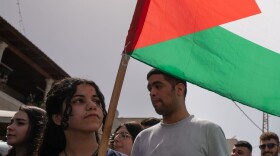
Jennifer Ludden
Jennifer Ludden helps edit energy and environment stories for NPR's National Desk, working with NPR staffers and a team of public radio reporters across the country. They track the shift to clean energy, state and federal policy moves, and how people and communities are coping with the mounting impacts of climate change.
Previously, Ludden was an NPR correspondent covering family life and social issues, including the changing economics of marriage, the changing role of dads, and the ethical challenges of reproductive technology. She's also covered immigration and national security.
Ludden started reporting with NPR while based overseas in West Africa, Europe and the Middle East. She shared in two awards (Overseas Press Club and Society of Professional Journalists) for NPR's coverage of the Kosovo war in 1999, and won the Robert F. Kennedy Award for her coverage of the overthrow of Mobutu Sese Seko in what is now the Democratic Republic of the Congo. When not navigating war zones, Ludden reported on cultural trends, including the dying tradition of storytellers in Syria, the emergence of Persian pop music in Iran, and the rise of a new form of urban polygamy in Africa.
Ludden has also reported from Canada and at public radio stations in Boston and Maine. She's a graduate of Syracuse University with degrees in television, radio, and film production and in English.
-
The conservative Cicero Institute is working with states to ban street camps, and shift money away from housing to addiction treatment. Homelessness advocates says such moves are counterproductive.
-
Four states so far have passed laws prohibiting the use of public money for no-strings cash aid. Advocates for basic income say the backlash is being fueled by a conservative think tank.
-
The U.S. Supreme Court hears arguments on whether people can be punished for sleeping outside. The decision could shape how cities manage record rates of homelessness.
-
Lower courts ruled it's "cruel and unusual" to fine or jail people on public land if no shelter is available. An Oregon city says that's hamstrung efforts to keep public spaces safe and open to all.
-
Palestinian citizens make up 20% of Israel's population, and many grieve the suffering in Gaza. Hundreds were arrested or lost jobs for questioning the war there, and doing so can still be perilous.
-
Last year, hundreds of Palestinian citizens of Israel were arrested for questioning the war in Gaza. But after six months of fighting, they are starting to hold antiwar rallies.
-
A lack of cash in Gaza has made daily life even more difficult, as people are unable to purchase desperately needed food and other supplies.
-
Benny Gantz, who leads an opposition party and also regularly faces the prime minister as part of the war Cabinet, is calling to set a date for elections. Polling shows Netanyahu would lose to him.
-
A U.N. Security Council resolution calls for an immediate cease-fire in Gaza. It passed after the U.S. abstained from blocking the measure. The move angered Israel, but how deep is the rift?
-
Religious scholars have broad exemption from military service. But critics say that's no longer sustainable, given their fast-growing population and the war in Gaza.





